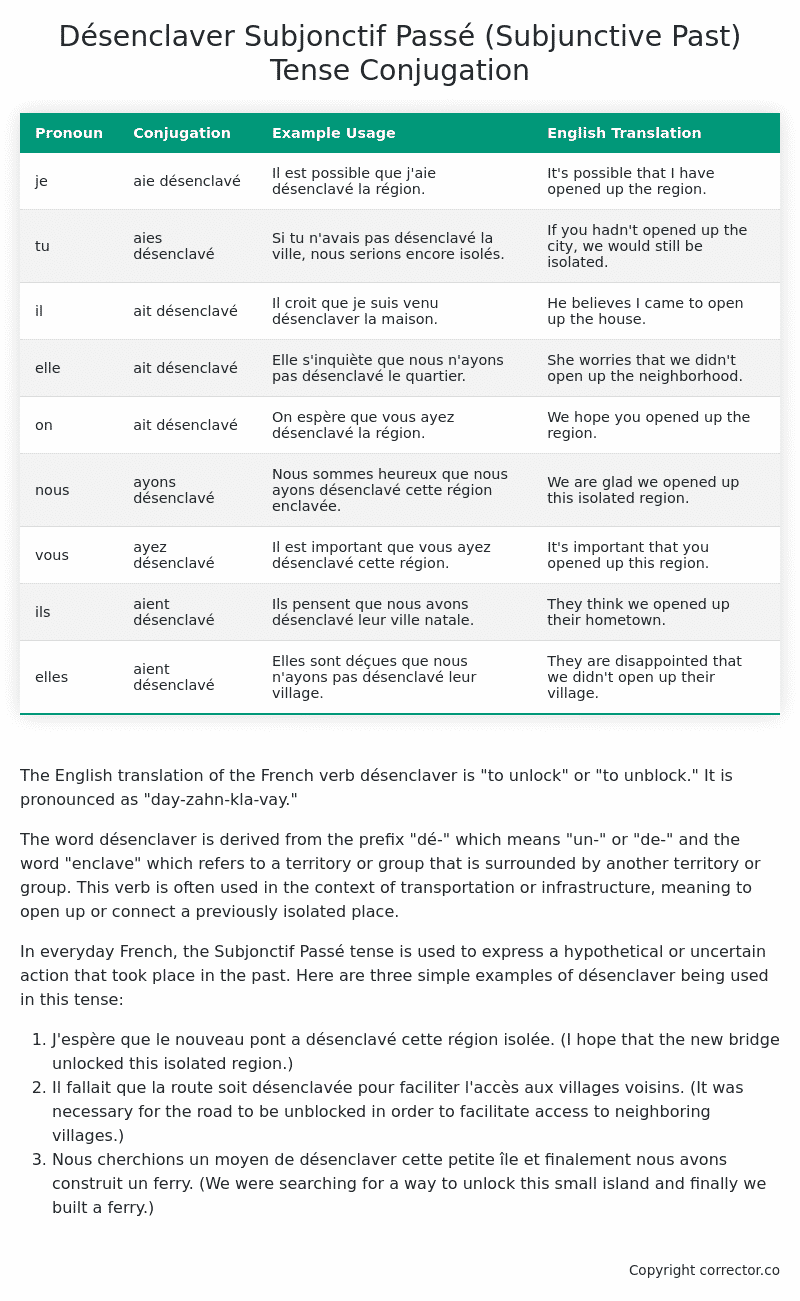Subjonctif Passé (Subjunctive Past) Tense Conjugation of the French Verb désenclaver
Introduction to the verb désenclaver
The English translation of the French verb désenclaver is “to unlock” or “to unblock.” It is pronounced as “day-zahn-kla-vay.”
The word désenclaver is derived from the prefix “dé-” which means “un-” or “de-” and the word “enclave” which refers to a territory or group that is surrounded by another territory or group. This verb is often used in the context of transportation or infrastructure, meaning to open up or connect a previously isolated place.
In everyday French, the Subjonctif Passé tense is used to express a hypothetical or uncertain action that took place in the past. Here are three simple examples of désenclaver being used in this tense:
- J’espère que le nouveau pont a désenclavé cette région isolée. (I hope that the new bridge unlocked this isolated region.)
- Il fallait que la route soit désenclavée pour faciliter l’accès aux villages voisins. (It was necessary for the road to be unblocked in order to facilitate access to neighboring villages.)
- Nous cherchions un moyen de désenclaver cette petite île et finalement nous avons construit un ferry. (We were searching for a way to unlock this small island and finally we built a ferry.)
Table of the Subjonctif Passé (Subjunctive Past) Tense Conjugation of désenclaver
| Pronoun | Conjugation | Example Usage | English Translation |
|---|---|---|---|
| je | aie désenclavé | Il est possible que j’aie désenclavé la région. | It’s possible that I have opened up the region. |
| tu | aies désenclavé | Si tu n’avais pas désenclavé la ville, nous serions encore isolés. | If you hadn’t opened up the city, we would still be isolated. |
| il | ait désenclavé | Il croit que je suis venu désenclaver la maison. | He believes I came to open up the house. |
| elle | ait désenclavé | Elle s’inquiète que nous n’ayons pas désenclavé le quartier. | She worries that we didn’t open up the neighborhood. |
| on | ait désenclavé | On espère que vous ayez désenclavé la région. | We hope you opened up the region. |
| nous | ayons désenclavé | Nous sommes heureux que nous ayons désenclavé cette région enclavée. | We are glad we opened up this isolated region. |
| vous | ayez désenclavé | Il est important que vous ayez désenclavé cette région. | It’s important that you opened up this region. |
| ils | aient désenclavé | Ils pensent que nous avons désenclavé leur ville natale. | They think we opened up their hometown. |
| elles | aient désenclavé | Elles sont déçues que nous n’ayons pas désenclavé leur village. | They are disappointed that we didn’t open up their village. |
Other Conjugations for Désenclaver.
Le Present (Present Tense) Conjugation of the French Verb désenclaver
Imparfait (Imperfect) Tense Conjugation of the French Verb désenclaver
Passé Simple (Simple Past) Tense Conjugation of the French Verb désenclaver
Passé Composé (Present Perfect) Tense Conjugation of the French Verb désenclaver
Futur Simple (Simple Future) Tense Conjugation of the French Verb désenclaver
Futur Proche (Near Future) Tense Conjugation of the French Verb désenclaver
Plus-que-parfait (Pluperfect) Tense Conjugation of the French Verb désenclaver
Passé Antérieur (Past Anterior) Tense Conjugation of the French Verb désenclaver
Futur Antérieur (Future Anterior) Tense Conjugation of the French Verb désenclaver
Subjonctif Présent (Subjunctive Present) Tense Conjugation of the French Verb désenclaver
Subjonctif Passé (Subjunctive Past) Tense Conjugation of the French Verb désenclaver (this article)
Subjonctif Imparfait (Subjunctive Imperfect) Tense Conjugation of the French Verb désenclaver
Conditionnel Présent (Conditional Present) Tense Conjugation of the French Verb désenclaver
Conditionnel Passé (Conditional Past) Tense Conjugation of the French Verb désenclaver
L’impératif Présent (Imperative Present) Tense Conjugation of the French Verb désenclaver
L’infinitif Présent (Infinitive Present) Tense Conjugation of the French Verb désenclaver
Struggling with French verbs or the language in general? Why not use our free French Grammar Checker – no registration required!
Get a FREE Download Study Sheet of this Conjugation 🔥
Simply right click the image below, click “save image” and get your free reference for the désenclaver Subjonctif Passé tense conjugation!

Désenclaver – About the French Subjonctif Passé (Subjunctive Past) Tense
Formation of the Subjonctif Passé
Everyday Usage Patterns
Interactions with Other Tenses
Present tense
Future tense
Conditional
Summary
I hope you enjoyed this article on the verb désenclaver. Still in a learning mood? Check out another TOTALLY random French verb conjugation!


